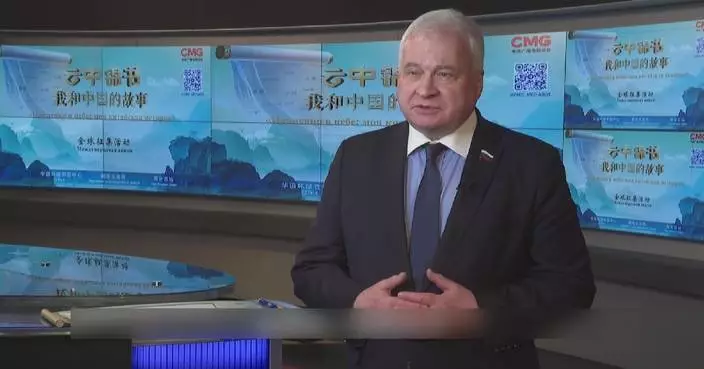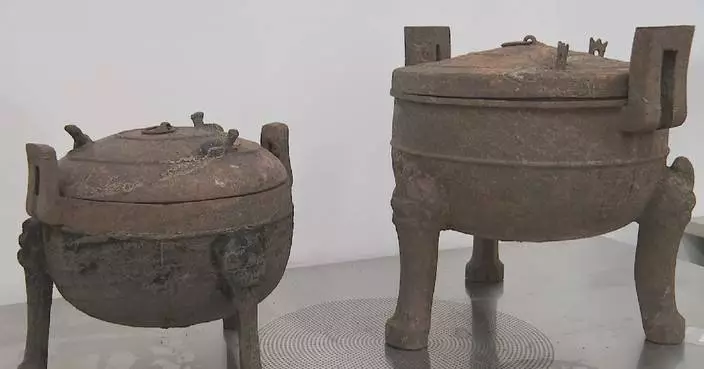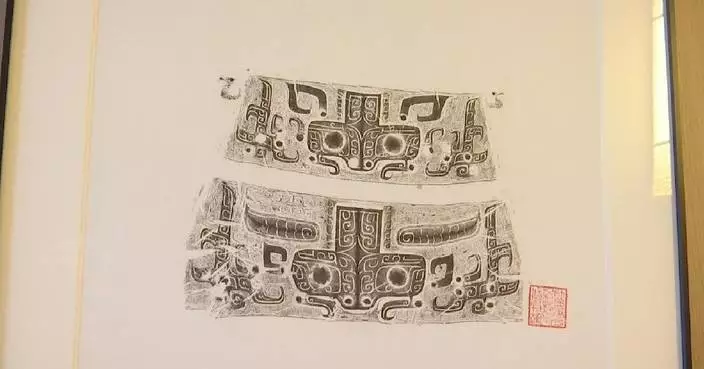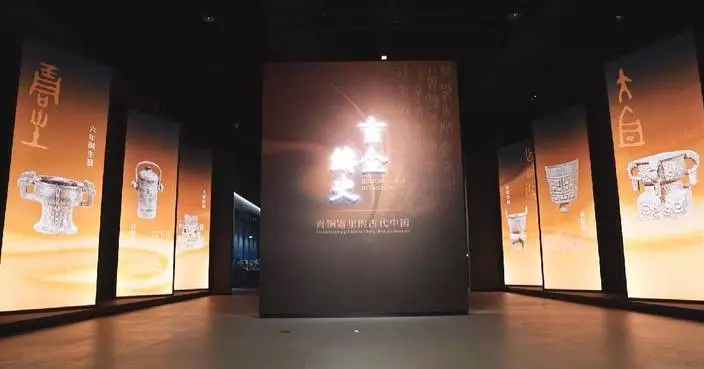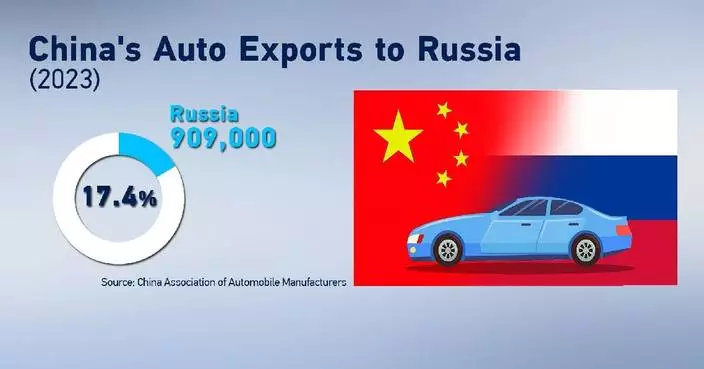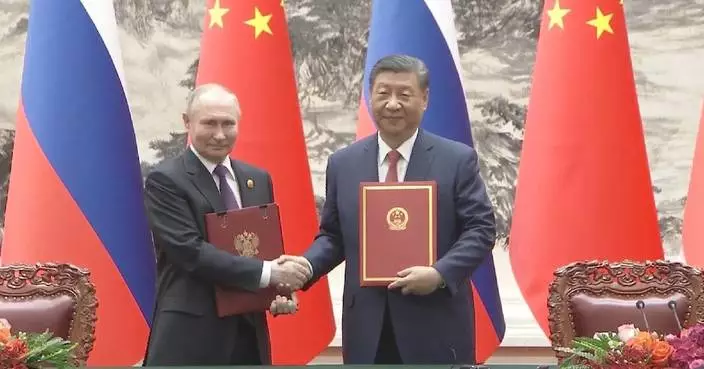China's experimental satellites Tiandu-1 and Tiandu-2, which accompanied the Queqiao-2 relay satellite to the Moon, have conducted successful new experiments on lunar communication and navigation technologies, China's Deep Space Exploration Lab (DSEL) said on Saturday.
The satellites carried out tests of high-reliability transmission and routing between Earth and the lunar surface. They also transmitted back the latest close-up images of the Moon.
The DSEL says the test satellites will conduct more experiments on lunar communication and navigation technologies, so as to provide strong support for design and construction of the planned International Lunar Research Station and China's own Queqiao integrated satellite network for lunar communication, navigation and remote sensing.
Tiandu-1, weighing 61 kilograms, is equipped with a Ka-band dual-frequency communicator, a laser retroreflector, and a space router.
Tiandu-2, weighing 15 kilograms, is fitted with communication and navigation devices.
China successfully launched the two test satellites along with the Queqiao-2 on March 20.
This orbital configuration provides several advantages over Queqiao, launched in 2018 for Earth-Moon relay communications.
Queqiao-2's orbit is closer to the Moon, greatly improving data transmission rates compared to Queqiao's distant path. It also enhances communication coverage of the lunar south pole region versus Queqiao's position around the Earth-Moon L2 Lagrangian point.
This optimized orbit is more fuel-efficient, allowing Queqiao-2 to maintain operations for an extended period using minimal propellant. Queqiao-2 will provide the relay services planned for ongoing lunar probes Chang'e-4 and the upcoming Chang'e-6 mission, conducting scientific exploration periodically.
The deployment of the Queqiao-2 relay satellite is a key step for China's future lunar exploration missions including Chang'e-6, Chang'e-7 and Chang'e-8.
The landing and sample collection sites for China's moon missions in the coming years are mainly in the lunar south pole region or on the far side of the moon. A more powerful relay satellite with more functions is necessary to provide communications and data transmission services for the missions, China National Space Administration (CNSA) said.
Chang'e-6 is scheduled for launch in the first half of 2024, while Chang'e-7 will be launched around 2026, and Chang'e-8 around 2028. Chang'e-7 and Chang'e-8 will form the basic model of a lunar research station to carry out further exploration of the lunar environment, according to the CNSA.

China's test satellites conduct successful experiments in earth-moon communications

China's test satellites conduct successful experiments in earth-moon communications
Chinese President Xi Jinping held a restrictive meeting with Russian President Vladimir Putin on Thursday at Zhongnanhai in Beijing, during which they had in-depth exchanges on strategic issues of common concern.
The world is undergoing changes unseen in a century and entering a new period of turbulence and transformation, Xi noted, adding that in the face of the ever-evolving world landscape with volatility and turmoil, China has maintained its strategic resolve.
He said that under the leadership of the Communist Party of China, the Chinese people have overcome various difficulties and challenges, and are striving to promote high-quality development and Chinese modernization.
China is willing to work with Russia and other countries to enhance solidarity and cooperation, steer global governance in the right direction, jointly safeguard international fairness and justice, and promote world peace and common development, Xi said.
Noting that China's development is unstoppable and that no force can contain China's growth and progress, Putin said that Russia is willing to improve cooperation with China and other Global South countries to promote international fairness and justice, and to work toward a more equal and multipolar world.
The two heads of state had an in-depth exchange of views on the Ukraine crisis.
Xi elaborated on China's consistent position and efforts to promote the political settlement of the Ukraine issue, stressing that to deal with any major issue, it is necessary to address both the symptoms and the root causes, and to plan for the present as well as for the long term.
He said the core of the Global Security Initiative is advocating the vision of common, comprehensive, cooperative and sustainable security, and the fundamental solution to the Ukraine issue is to promote the establishment of a new balanced, effective and sustainable security architecture.
Xi said China supports the convening of an international peace conference recognized by Russia and Ukraine at an appropriate time with equal participation and fair discussion of all options, so as to push for an early political settlement of the Ukraine issue, and China stands ready to continue to play a constructive role in this regard.
Putin introduced the relevant views and positions of Russia, saying that Russia appreciates China's objective, just and balanced position on the Ukraine issue and welcomes China to continue to play an important and constructive role in the political settlement of the issue. Russia is committed to resolving the Ukraine issue through political negotiations and is willing to demonstrate sincerity and maintain close communication with China in this regard, he said.
Xi said that over the years, they have had many meetings and every exchange has been candid, in-depth and fruitful.
Xi said he is ready to stay in close contact with President Putin and work together to steer the development of China-Russia relations in the right direction, guide the China-Russia comprehensive strategic partnership of coordination for the new era to achieve steady and lasting progress, bring more benefits to the two peoples, and contribute to world security and stability.
Putin thanked Xi for his warm hospitality, saying that he is willing to maintain close communication with Xi, implement the important consensus reached between them, and ensure the full development of the Russia-China comprehensive strategic partnership of coordination for the new era.

Xi holds restrictive meeting with Putin at Zhongnanhai

Xi holds restrictive meeting with Putin at Zhongnanhai

Xi holds restrictive meeting with Putin at Zhongnanhai

Xi holds restrictive meeting with Putin at Zhongnanhai










